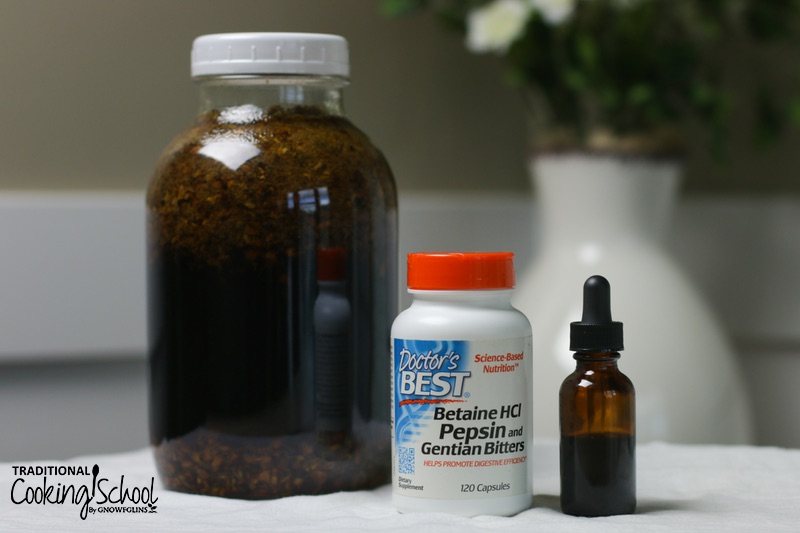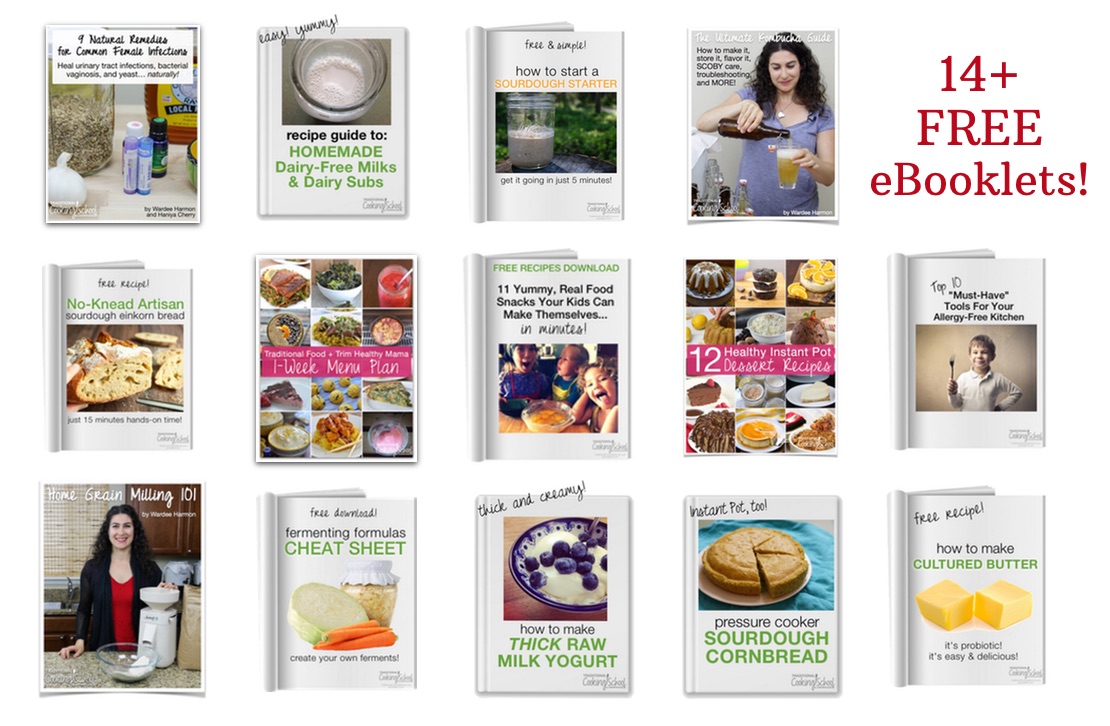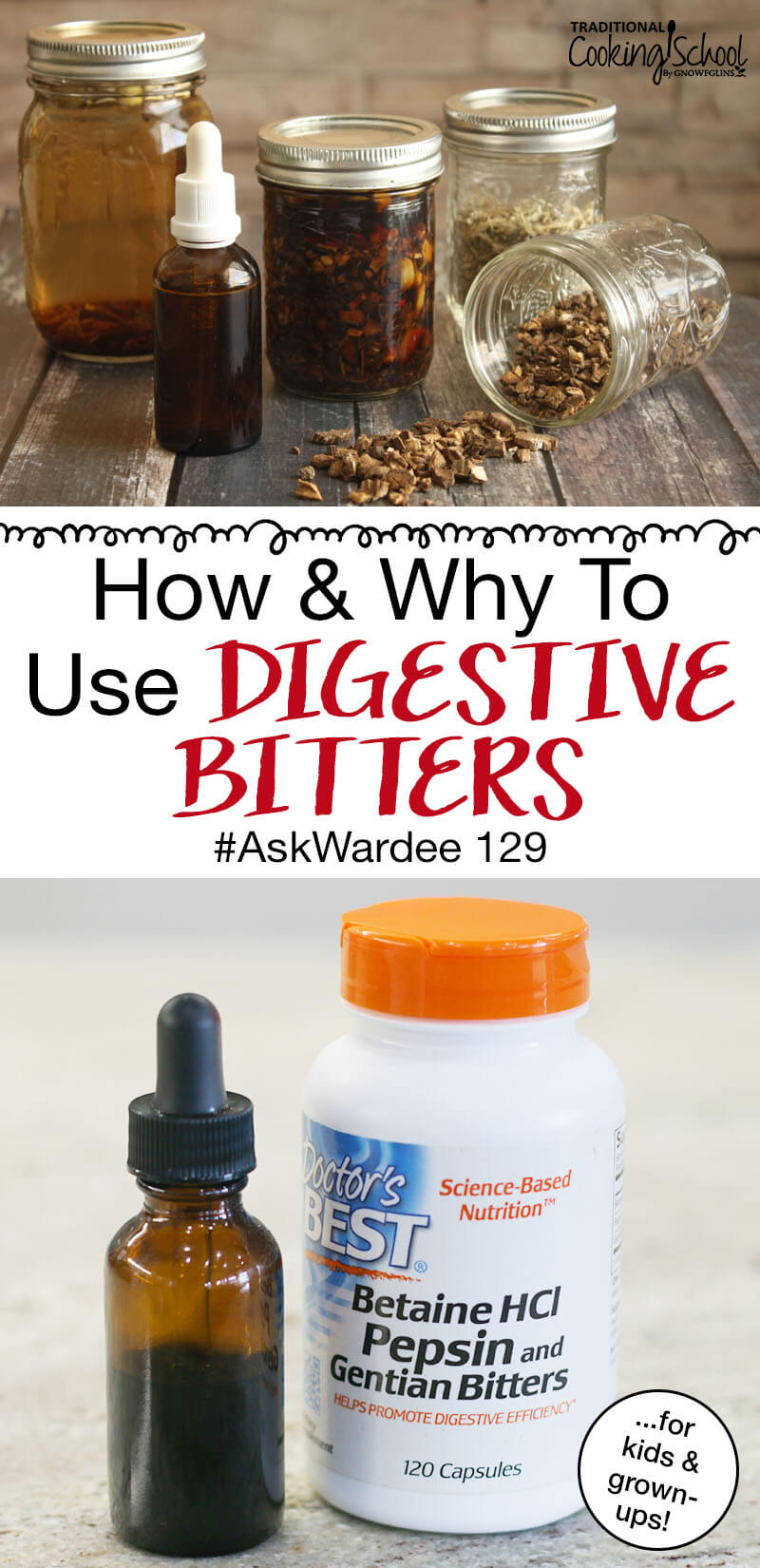
Heard about digestive bitters and wonder if they could help you with digestive discomfort? Can kids use them? What are they, anyway? Can you make them yourself and save money?
Some of these questions came in from Rachel M. and I’m thrilled to tackle the topic of digestive bitters on today’s #AskWardee.
<
Subscribe to #AskWardee on iTunes, Stitcher, YouTube, or the Podcasts app.
Table Of Contents
The Question: What Are Digestive Bitters, How Do They Help, And Who Can Use Them?
Rachel M. asked:
Hello! I had a question about digestive bitters. I have heard about them and even read about them a little bit, but are you able to condense in an understandable way exactly what they are and how they are helpful? Also, where do you get good quality bitters and how often do you suggest taking them? What about giving them to children? Thank you!
Rachel, thank you for your question!
Because we’re featuring your question today’s #AskWardee, you’re getting a gift — a FREE Mini eCourse! Our team will be in contact with you so you can choose which one you’d like!)
What Are Digestive Bitters?
Put simply, digestive bitters are food compounds such as herbs, roots, fruit, bark, and greens that improve your digestion by stimulating your digestive system and production of digestive enzymes. And, they improve the function of your digestive organs such as your liver, and promote overall good health.
Although they can be eaten directly (such as bitter greens in salad), they are most often concentrated into infusions or tinctures and consumed that way.
And yes, they often have a bitter, sour, or bittersweet flavor!
Examples Of Digestive Bitters
As Andrea, TCS writer, shared in 3 Easy Ways To Use Digestive Bitters, you can eat bitter greens such as chicory, radicchio, dandelion, and arugula.
You can also make bitter infusions or tinctures using bitter herbs such as dandelion, burdock, yellow dock, fennel, or gentian root. (More bitter herbs are listed here.)
An infusion is where you steep a higher concentration of herbs (compared to tea) in hot water and for longer than you would tea. Ideally, you’re preparing it the day or evening before, then straining and sipping on it with your meals.
A tincture is where you cover the herbs with alcohol or glycerin to draw out their properties. An alcohol tincture takes 6 weeks in a dark, cool cupboard. An alcohol-free glycerin based tincture takes 3 days in a warm environment such as a crockpot.
- Click here for instructions on making homemade infusions and tinctures.
- Click here for directions on making alcohol-free tinctures.
Who Can Use Digestive Bitters
Anyone who experiences regular tummy aches or heartburn from eating, either immediately or hours later, can benefit from digestive bitters!
Anyone who feels their digestion is sluggish and could use a boost can benefit from digestive bitters.
Can Children Take Digestive Bitters?
Although you should consult with your doctor and do your own research, it is generally known that children over the age of 2 may use digestive bitters. Always reduce the recommended serving size down proportionately with the child’s size.
For instance, most serving sizes are for an adult weighing 150 pounds. So a child weighing 75 pounds would get half the amount. And so on.

How To Use Digestive Bitters
You can incorporate bitter greens such as chicory, radicchio, dandelion, and arugula in your salads. While I don’t enjoy an entire salad of bitter greens, I do enjoy these greens when balanced with other flavors that are mild, sweet, or sour.
If you feel you need more help than what raw greens provide, infusions and tinctures can provide more concentrated digestive help. Sip on a bitter infusion before, during, and after a meal. Or dilute a dropperful of a tincture in 1 ounce of water and drink before, during, or after your meal.
Finally, another option is to take capsules such as the one pictured above. It contains HCl to balance stomach acid levels, pepsin to help with protein breakdown, and gentian to stimulate and support digestion as I shared previously.
How To Make Digestive Bitters
You can save a bundle if you make your own infusions and/or tinctures!
- Click here for instructions on making homemade infusions and tinctures.
- Click here for directions on making alcohol-free tinctures.
What Bitter Herbs To Use In Your Homemade Tinctures & Infusions
This list is copied from 3 Ways To Use Digestive Bitters. Use singles or a blend when making your own tinctures and infusions!
- Artichoke stimulates the liver, may lower cholesterol, and is an antioxidant (source).
- Barberry especially benefits the liver and gallbladder. It is a mild laxative and cleanses the system. (Source.)
- Black walnut cleanses and tones the colon, and helps prevent leaky bowel syndrome (source).
- Burdock stimulates digestive juices (especially bile) and improves appetite (source).
- Centaury strengthens the stomach, promotes digestion, and helps with diarrhea (source).
- Chamomile relaxes, relieves indigestion and inflammation, and eases flatulence (source).
- Dandelion is a diuretic and especially benefits the liver and gall bladder (source).
- Fennel relieves flatulence and stimulates digestion and appetite (source).
- Gentian root stimulates digestive juices and accelerates emptying of the stomach. It’s particularly useful for a sluggish digestive system or lack of appetite. (Source.)
- Goldenseal reduces unhealthy secretions (excessive, mucous, or bloody) while increasing good secretions like bile and pancreatic enzymes. Also promotes appetite. (Source.)
- White horehound stimulates the gallbladder (source).
- Wormwood stimulates the digestive process and helps indigestion (source).
- Yarrow increases appetite, aids digestive cramps, bloating, and colic, and normalizes blood circulation (source).
- Yellow dock promotes flow of bile and eases constipation (source).
Where To Buy Bitter Herbs
If you want to buy pre-made bitter tinctures, try these from Herb Pharm.
To make your own infusions and/or tinctures, we recommend Frontier and Starwest Bontanicals.
What About The Bitter Taste?
Although it’s true that for many, the bitter taste will take some adjustment, when making your own infusions or tinctures, you can add balancing and complementary ingredients such as cardamom, cinnamon, clove, or ginger. They will help it taste better! More info on this here.
More Traditional Cooking Info…
If you haven’t already, be sure to sign up for the FREE Traditional Cooking Cupboard… you’ll get 14+ FREE eBooks featuring recipes, info, and articles on Traditional Cooking School, and a free Traditional Cooking video series!
Click here to grab your 14+ free eBooks and free video series today!
Any Questions Or Comments?
If you have other questions or comments about your own experience with bitters, be sure to leave them in the comments!
Helpful Links
- FREE 14+eBooks and FREE Traditional Cooking Video Series
- 3 Easy Ways To Use Digestive Bitters
- Complete list of beneficial bitter herbs
- 2-Ingredient Digestive Bitters Recipe — from my friend Megan featuring gentian
- How To Make Bitter Infusions and Tinctures
- How To Make Alcohol-Free Herbal Tinctures
- Betain HCl with Pepsin & Gentian Bitters Capsules
- Herb Pharm Better Bitters pre-made tincture
- Starwest Bontanicals — bulk organic herbs
- Frontier — bulk organic herbs
What Is The #AskWardee Show?
The #AskWardee Show is the live weekly show devoted to answering your niggling questions about Traditional Cooking: whether it’s your sourdough starter, your sauerkraut, preserving foods, broth, superfoods or anything else to do with Traditional Cooking or your GNOWFGLINS lifestyle.
I share tips and resources, plus answer your questions about Traditional Cooking!
The Details
When: Wednesdays at 10am Pacific / 1pm Eastern
Where: Traditional Cooking School on Facebook Live or @TradCookSchool on Instagram Live
What If You Can’t Make It?
Don’t worry. You can catch the replays or listen to the podcast!
- Come back here to AskWardee.TV; all replays will be up within hours of airing live; the print notes are always posted at the same time I go live.
- Go to Traditional Cooking School on Facebook to view the Facebook Live replay or go to @TradCookSchool on Instagram on your phone or tablet (Instagram recording only lasts 24 hours).
- Subscribe to the #AskWardee podcast on iTunes, Stitcher, YouTube, or the Podcasts app. While you’re there, be sure to leave a rating and review!
Want To Get YOUR Question Answered?
Here’s how to submit your question. If we answer it on #AskWardee, you’ll get a gift!
- Tweet your question to @TradCookSchool on Twitter; use hashtag #AskWardee
- Send an email to wardee at AskWardee dot tv — add #AskWardee to your email so I know it’s for the show
Please do NOT add future questions for #AskWardee to the comments of this post because they might get missed!
Do you use digestive bitters? What is your favorite form — greens, infusions, tinctures, capsules or ???
We only recommend products and services we wholeheartedly endorse. This post may contain special links through which we earn a small commission if you make a purchase (though your price is the same).




Wardee, I know you aren’t a doctor, but I’m hoping some of your readers might be in the appropriate medical field. So…many herbs work to improve the health of the gallbladder — I have no gallbladder, it was removed in 1994. Therefore, my bile production is reduced. I have difficulty if my food contains too much oil or fat. What food and/or herbal combinations can help me better digest what I eat so I don’t have to worry about being close to a bathroom all the time? Hopefully someone can help.
Hi, Doreen.
Bitters made with gentian would be great for you. It can really help with digesting fat and protein. 🙂
~Danielle, TCS Customer Success Team